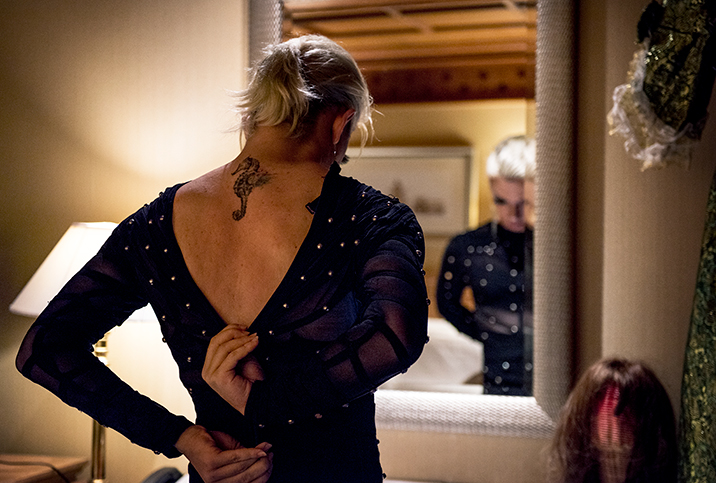Exploring Identity in Sean Baker's 'Tangerine'

It's hard to think of a group more underrepresented in movies and TV than the transgender community. When trans people do appear on screens, the action is rarely handled with nuance or tact. Think: Samantha of "Sex and the City" mockingly pouring water on the trans sex workers outside her apartment building. Other trans depictions can prove awfully bleak, moving as they might be. Think: the beautifully acted and directed tragedy of Brandon Teena as played by cisgender actress Hilary Swank in "Boys Don't Cry."
Since those days, there hasn't been a ton of airtime dedicated to trans people living out their everyday (at least by fictional standards) lives in pop culture. That's changing, with no small help from the likes of the groundbreaking French drama "Laurence Anyways" and the stunningly frank approach to teen transitioning on HBO's "Euphoria."
Despite this small uptick, a gem has been lost.
No trans-related movie has been bolder, richer, franker or more beautiful in depicting the trans experience than 2015's "Tangerine," the microbudget feature by Sean Baker, who went on to make the Oscar-nominated "The Florida Project" and 2021's critically adored "Red Rocket," starring Simon Rex as a washed-up porn star. (All of Baker's movies, in one way or another, tend to involve sex. They're also careful not to glamorize it.)
"Tangerine" deserves another look, as it's a movie anyone can relate to and will undoubtedly learn from, whether the topic of transgender identity is intimately familiar or galaxies-away foreign. This makes it the essential trans movie. Bonus: It also happens to be a great watch.
Empathy and specificity
What "Tangerine" nails that so many other movies of its kind don't is that it both is and isn't about being trans. It takes a nonjudgmental, even casual perspective to its main characters. Baker, in a favorite technique, cast nonactors as the main characters: best friends Sin-Dee Rella (played by Kitana Kiki Rodriguez) and Alexandra (Mya Taylor), poor trans female sex workers in Los Angeles. Both actors are trans themselves and acquainted with the subject matter.
It should be noted that Baker is a cisgender white man. He's also proved his chops at entering spaces that aren't necessarily his and letting their stories naturally unfold. It's not for nothing that "Tangerine" skips the customary director's credit first in the end credits to give the trans stars and close collaborators top billing.
Fast, dangerous, funny
Things get going fast, and dangerous, in "Tangerine." The tight plot starts and ends at the now-closed Donut Time shop in Los Angeles. Sin-Dee has just gotten out of prison on Christmas Eve to find out her boyfriend/pimp/drug dealer Chester (James Ransone) has been cheating on her with a "fish" (queer code for a cisgender woman, or as Alexandra puts it, someone with a "vagina and everything"), and a white fish at that. Sin-Dee proceeds to literally stomp her way through Hollywood, particularly an area known as a place to pick up trans prostitutes, in search of revenge.
Baker quickly and cleverly complicates this seemingly easy narrative of trans depravity. Sin-Dee isn't deflated; she's purposeful. She and Alexandra get misgendered, ripped off and called "tranny f----ts." But the joke is never on them, it's on everyone else. They experience deep pain, of course, but manage to find humor in moments as superficial as a woman's terrible hairstyle, and the wig, makeup and wardrobe choices of peers. That's the coping mechanism of the marginalized.
Where "Tangerine" becomes masterful is when it seamlessly synchronizes their issues with that of an Armenian cab driver, Razmik (Karren Karagulian), who hides his affection for trans women from his traditional family. At one point, dual shots of Razmik in his home and Sin-Dee and Alexandra at a bar, where Alexandra is performing old-timey tunes to a virtually empty room, show them all gazing at themselves in mirrors. The meta-mirroring effect is earned: These are people who want to be themselves but can't find the ways to express their sexual identities in a world that shuns them.
Yet "Tangerine" is oddly uplifting. The Christmas spirit isn't felt much except in passing cheap, multicolored lights and a Santa tree farm. But it's there in the end, as the characters pass through L.A., which one character not incorrectly calls a "beautifully wrapped lie," lost and in search of something like connection and home. Sin-Dee and Alexandra find it in each other, however briefly, when the world melts away. Yes, they trade wigs.


















